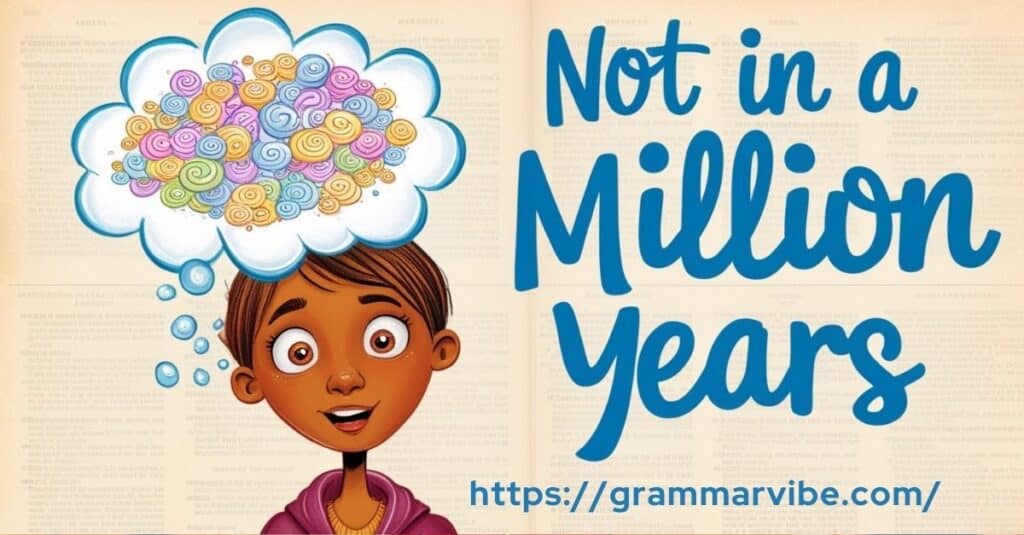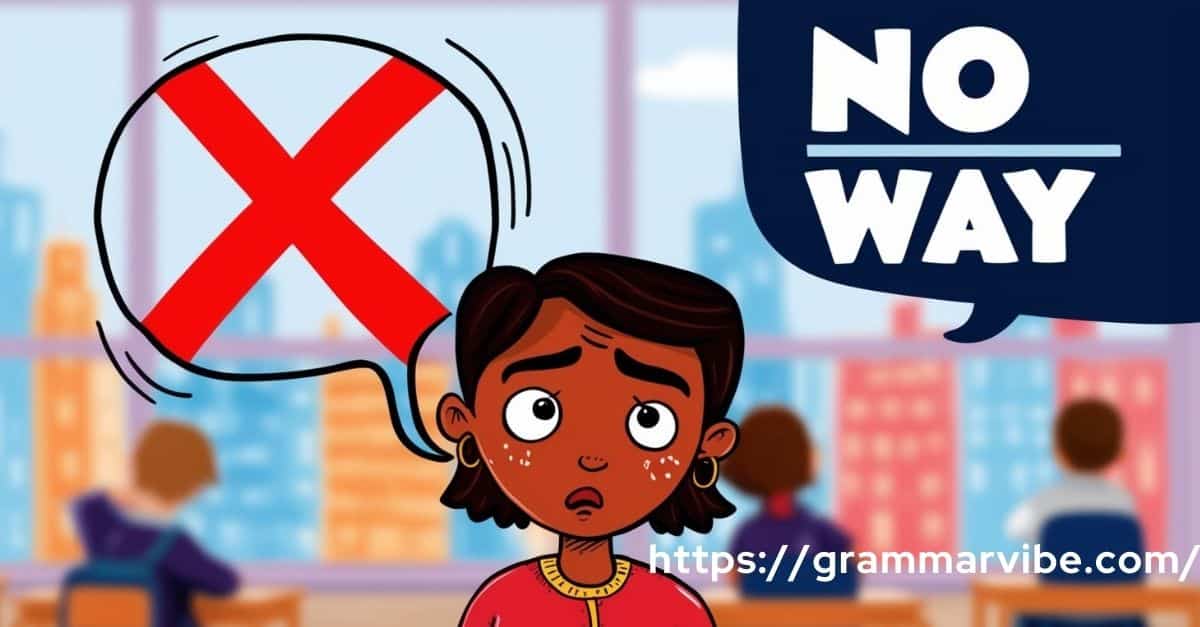In both casual and professional settings, there are times when you want to express a refusal, disbelief, or just a flat-out “No.” While saying “No way” is a common and easy response, it’s often helpful to add variety to your language. Using different phrases can make your communication more nuanced, creative, and suitable for different contexts. Whether you’re refusing an offer, showing skepticism, or rejecting a suggestion, there are plenty of alternative ways to say “No way.”
Here we will explore 15 alternative expressions for saying “No way,” offering real-life examples in both casual conversations and formal settings. By the end, you’ll have a rich set of phrases to help you express disagreement more effectively and confidently.
1. Absolutely Not
When you want to make it crystal clear that something is out of the question, “Absolutely not” is a great option. It conveys strong conviction and is often used when you need to refuse something decisively.
Scenario Example (Email):
Subject: Can You Help With This Project?
Hi Sarah,
I hope you’re doing well. I received your request for help with the new project, but I have to say, absolutely not. I’m already overloaded with tasks, and taking on another project would stretch me too thin. I hope you understand.
Best,
John
In this case, “absolutely not” clearly communicates John’s refusal without room for debate. It’s assertive but not aggressive.
2. Not a Chance
This phrase has a more casual tone but still delivers a firm rejection. It’s perfect for conversations where you want to show that whatever was proposed is impossible.
Scenario Example (Text Message):
Mark: “Hey, want to join me for a midnight movie?” You: “Not a chance, Mark. I need my sleep tonight!”
“Not a chance” makes it clear that there is no possibility of agreeing to the proposal.
3. No Way José
A fun, playful variation of “No way,” this phrase adds some humor and lightness to the rejection. It’s a great choice for informal settings with friends or family.
Scenario Example (Casual Conversation):
Anna: “Do you want to try skydiving this weekend?” You: “No way, José! I’m terrified of heights.”
Using “No way José” shows a playful tone while still being a firm no. It’s a way to reject something without sounding too harsh.
You might also like: 15 Other Ways to Say “Strong Work Ethic”
4. Definitely Not
If you want to make it clear that something is not even worth considering, you can say “Definitely not.” It’s a direct way to express your refusal.
Scenario Example (Email):
Subject: Can You Stay Late Tonight?
Hey Peter,
Thanks for asking, but I have to tell you that definitely not. I’ve got prior commitments tonight, so staying late is not an option.
Best,
Claire
“Definitely not” is a clear and decisive way to say “No” without leaving any ambiguity.
5. Not in a Million Years

This expression emphasizes that the possibility of something happening is so remote that it’s practically impossible. It works great when rejecting something you consider absurd or unlikely.
Scenario Example (Phone Call):
David: “Would you ever move to another country for work?” You: “Not in a million years. I love where I live too much!”
This response makes it clear that you would never consider the option under any circumstances.
Check out this: 15 Other Ways to Say “Good Girl”
6. Forget It
This phrase suggests that the request or suggestion is so off the table that it’s better to move on. It’s often used when someone continues to push for something that’s already been rejected.
Scenario Example (Casual Conversation):
Emily: “How about a third round of drinks?” You: “Forget it, I’m good. Let’s just head home.”
“Forget it” signals that further discussion is unnecessary.
7. Not Interested
When you don’t want to give the impression that you’re rejecting something harshly but still want to refuse, “not interested” is a polite, straightforward way to express disinterest.
Scenario Example (Email):
Subject: New Investment Opportunity
Hi Thomas,
Thanks for sharing, but I’m not interested in this investment opportunity at the moment. I’m focused on my current portfolio.
Best,
Alex
“Not interested” is direct but polite. It’s perfect for situations where you don’t want to engage further.
8. No Can Do
This phrase is a casual way to let someone know you’re unable to fulfill their request. It’s typically used when you lack the ability or resources to do what’s being asked.
Scenario Example (Text Message):
Jessica: “Can you come help me move tomorrow?” You: “No can do, I’m already booked with other plans.”
It’s a friendly yet firm way to express inability without sounding too negative.
More for you: 15 Other Ways to Say “This Quote Shows”
9. Out of the Question
This expression is formal and is used when you want to express that something is absolutely impossible or unacceptable, often in professional settings.
Scenario Example (Business Meeting):
Boss: “Can you take on a new project by the end of the week?” You: “Out of the question. I have a full workload, and I can’t handle more at this time.”
“Out of the question” makes it clear that there is no room for negotiation.
10. Not Gonna Happen
This casual phrase expresses a strong rejection with a bit of finality. It’s a great way to firmly refuse something, especially when the other person keeps pushing.
Scenario Example (Phone Call):
Jack: “How about we go out for dinner at midnight?” You: “Not gonna happen, Jack. I’m already in bed!”
“Not gonna happen” is direct and makes it clear that the proposal is off the table.
11. No Dice
This is a fun, informal way to say “No” when something is clearly not going to happen. It’s often used to reject a proposal in a light-hearted way.
Scenario Example (Casual Conversation):
Jordan: “How about a quick road trip to the beach tomorrow?” You: “No dice, I’ve got work in the morning.”
“No dice” adds a bit of flair to the refusal and softens the impact of the rejection.
12. Absolutely Out of the Question

This phrase is stronger than “out of the question.” It emphasizes that something is not even worth considering and is typically used when discussing important matters.
Scenario Example (Email):
Subject: Can You Take on More Tasks?
Hi Lisa,
After reviewing my schedule, I can confidently say that taking on more tasks is absolutely out of the question at this time. I’m already committed to my current responsibilities.
Best regards,
Mike
“Absolutely out of the question” leaves no doubt that the request is completely unacceptable.
For your interest: 15 Other Ways to Say “How Did You Sleep?”
13. Not Happening
This phrase is a casual way to emphasize that something is not going to occur, often used in light-hearted or personal settings.
Scenario Example (Text Message):
Emma: “Want to go on a camping trip this weekend?”
You: “Not happening. I’m not spending my weekend fighting mosquitoes!”
“Not happening” conveys a clear refusal with a bit of humor.
14. Fat Chance
This sarcastic phrase is used to highlight that the possibility of something occurring is extremely slim, often paired with disbelief or humor.
Scenario Example (Casual Conversation):
Ben: “Do you think the boss will give us all an extra day off next week?”
You: “Fat chance! He barely approved last Friday’s half-day.”
“Fat chance” adds a playful tone to a skeptical response.
15. Over My Dead Body
This dramatic phrase conveys strong opposition and is often used when rejecting something you feel very strongly about.
Scenario Example (Family Conversation):
Teenager: “Can I borrow the car to go on a road trip with friends?”
Parent: “Over my dead body! You’re not driving that far without supervision.”
“Over my dead body” is a colorful and firm way to say “No way,” showing absolute refusal.
These additions provide even more variety for expressing disagreement, from casual to dramatic!
Table of Synonyms for “No Way”
| Synonym | Usage Example |
|---|---|
| Absolutely Not | Sarah: “Can you help with the project?” You: “Absolutely not. I’m already swamped with work.” |
| Not a Chance | Mark: “Want to join me for a midnight movie?” You: “Not a chance. I need my sleep tonight!” |
| No Way José | Anna: “Do you want to try skydiving?” You: “No way José! I’m terrified of heights.” |
| Definitely Not | Peter: “Can you stay late tonight?” You: “Definitely not. I’ve got prior commitments.” |
| Not in a Million Years | David: “Would you ever move to another country?” You: “Not in a million years. I love it here.” |
| Forget It | Emily: “How about another round of drinks?” You: “Forget it. Let’s just head home.” |
| Not Interested | Thomas: “How about investing in this opportunity?” You: “Not interested at this time.” |
| No Can Do | Jessica: “Can you help me move tomorrow?” You: “No can do. I’m already booked.” |
| Out of the Question | Boss: “Can you take on more projects?” You: “Out of the question. I’m at capacity.” |
| Not Gonna Happen | Jack: “Let’s go out at midnight.” You: “Not gonna happen. I’m already in bed!” |
| No Dice | Jordan: “Road trip tomorrow?” You: “No dice. I’ve got work in the morning.” |
| Absolutely Out of the Question | Lisa: “Can you take on more tasks?” You: “It’s absolutely out of the question right now.” |
| Not Happening | Emma: “Camping this weekend?” You: “Not happening. I’m not fighting mosquitoes all weekend!” |
| Fat Chance | Ben: “Will the boss give us a day off?” You: “Fat chance! He barely approved last week’s half-day.” |
| Over My Dead Body | Teenager: “Can I borrow the car?” Parent: “Over my dead body! You’re not driving that far.” |
Conclusion
Changing up your language and using alternative ways to say “No way” can make your communication feel more dynamic and appropriate for a range of situations. Whether you’re in a casual conversation with friends or handling professional disagreements, the right phrase can make your refusal clearer, more effective, and even more polite.
With the variety of options available, you can tailor your response based on the context and the tone you want to set. So next time you need to express a strong rejection, remember these creative responses and use them to add spice to your language!

Kyren Paul is an experienced blogger and the creative mind behind “Grammar Vibe.” With a passion for the nuances of English grammar, he brings clarity and insight to everyday language topics, making grammar accessible and engaging for readers of all levels.









Leave a Comment